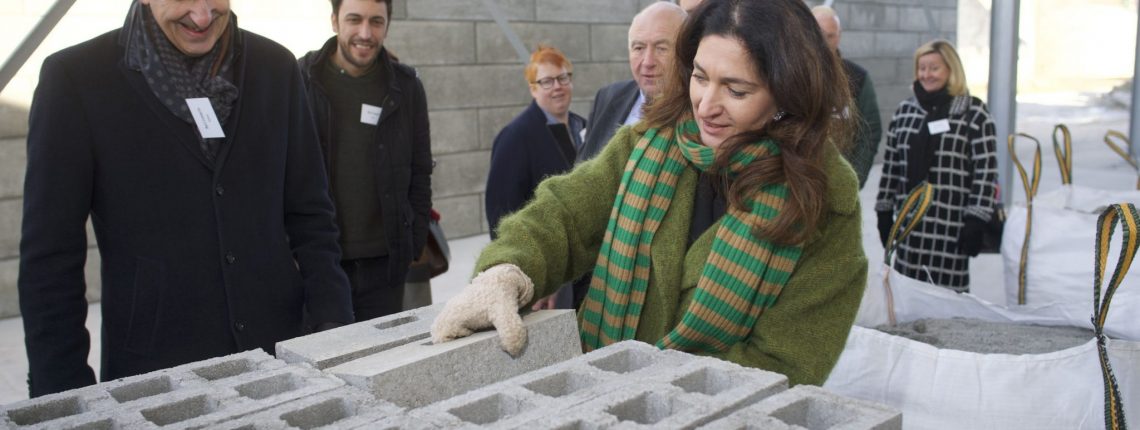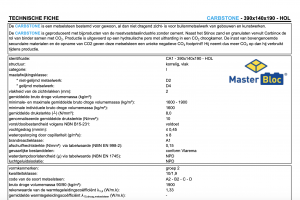Carbstone
Circular building blocks without cement
With the introduction of Carbstone, Masterbloc was the first building materials manufacturer to succeed in offering, on an industrial scale, a circular, CO2-negative and cement-free alternative to the traditional concrete block.
The applied carbonation technology, developed by our partner Orbix, converts metal slag from the steel industry into circular products with added value. CO2 acts as a binding agent in this process, eliminating the use of cement. A huge step forward when you know that cement production is responsible for about 10% of global CO2 emissions!
Carbstone in a nutshell:
- CO2-negative: during the production of our Carbstone blocks, more CO2 is absorbed than emitted. Moreover, the blocks also extract CO2 from the air afterwards, which they retain forever.
- Cradle-to-cradle: In the production process, valorised slag is converted into useful material. This makes Carbstone building blocks 100% recyclable, time after time. When the blocks are crushed after the demolition of a building, only sand and gravel remain.
- High compressive strength: as the bricks keep absorbing CO2 from the air even after they have been processed, they become harder and harder. This results in walls with an extremely high load-bearing capacity.
WHAT IS CARBONATION?
Carbonation is the natural process by which Ca-containing materials react with carbon dioxide and transform into calcium carbonate. That calcium carbonate, better known as limestone, is found globally in the subsurface and is an important source of natural CO2 storage. Although the Romans already knew how to make clever use of this process, it disappeared into the background for a long time. Until recently, due to the demand for sustainable CO2 storage, industry showed renewed interest in it.
Besides CO2, it also requires a source of calcium oxide, in this case slag. Slag is the by-product of steel production and has been recycled for years to recover the metal and gravel. Until recently, What remained had no industrial use at all. However, thanks to this patented process, it can now be converted into high-quality building materials by adding CO2.
CARBSTONE APPLICATIONS
To offer you maximal flexibility in every construction project, our Carbstone building blocks are available as:
- Traditional masonry blocks
- Climasono masonry blocks
- Adhesive blocks
- Climasono adhesive blocks
- MasterWalls prefab wall
- Soundblox acoustic blocks
They come in all common formats in both solid and hollow versions. For more information, prices and delivery times, please contact us. Would you like to know more about Carbstone? Then also visit our website www.carbstone.be
PILOT PROJECT COFINIMMO MECHELEN
Contractor company Vanhout was also involved in this world premiere during the circular and CO2-neutral renovation of the Cofinimmo office building in Mechelen, which also houses the OVAM headquarters. Although the works have not yet been completed, below we would like to show you some photos of the Carbstone walls that have already been raised.
CASE STUDY - PROJECT ICEBERG
With our Carbstone building blocks, we also contribute our bit to Project Iceberg, an international collaboration between 35 partners (including Colruyt and Orbix) from no fewer than 10 different countries that aspires to a circular economy of building materials. This project aims to develop new, cost-effective and, above all, smart solutions for the improved recovery of secondary raw materials throughout the circular value chain: from discarded building materials to new building products made with circularity and resource efficiency in mind; and containing 30-100% high-purity (>92%) recycled materials.
This project uses aggregates derived from the demolition of old Colruyt supermarkets. These are upcycled and supplemented with Carbinox to then cure in our CO2 drying chambers. In this way, construction waste is converted to the full 100% into new, high-quality building blocks with a negative CO2 balance. After all, more CO2 is absorbed than emitted during production and, moreover, the blocks will continue to absorb CO2 even after processing – provided they are placed in the open air. All this happens under the watchful eye of VITO, a Flemish independent research organisation in the field of cleantech and sustainable development.
CARBSTONE IN THE MEDIA
Relive this world premiere in the press article below:
FREQUENTLY ASKED QUESTIONS
What happens when you drill the Carbstone blocks?
The composition will not expand as a result of the drilling. The CO2 will therefore remain trapped.
Is it healthy living in a building that was raised using Carbstone blocks?
Absolutely, the blocks will continue to store CO2. However, this does not mean that they release it into the house. They bind more and more and thus become harder.
Are Carbstone blocks as solid as traditional concrete blocks?
Yes, they meet the exact same specifications (see technical sheet). In addition, Carbstones – when used outdoors – will continue to absorb CO2, hardening them even further and, as a result, making them stronger.
What’s the average delivery time?
The minimum curing time of the blocks is 24h, unlike traditional masonry blocks that require 3 weeks. The production time always varies according to the order size. Please contact us for more information.
TECHNICAL DATASHEETS
Download the technical datasheet of your desired building block below



